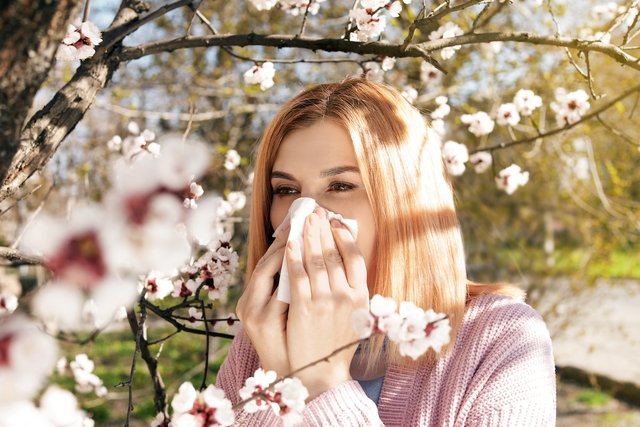Allergic rhinitis is an inflammation of the nasal mucosa that occurs after contact with allergenic substances such as dust, dog hair, pollen or some plants, for example, and is more common during spring or autumn.
The symptoms of allergic rhinitis appear as soon as you come into contact with the irritating agent, with a blocked nose, sneezing, runny nose and itchy nose and eyes.
Allergic rhinitis has no cure and, therefore, treatment includes changing habits such as avoiding contact with substances that cause symptoms to appear, in milder cases, and the use of antihistamines for those who have recurrent attacks, according to the advice of the allergist.

Main symptoms
The main symptoms of allergic rhinitis are:
- Constant runny nose;
- Sneezing;
- Eye watering and itching;
- Itchy nose and eyes;
- Cough;
- Headache.
Although they are more frequent in spring and autumn, allergic rhinitis symptoms can occur at any time of day or season, varying according to the allergenic substance. Learn about other symptoms of allergic rhinitis and how to confirm it.
How the diagnosis is made
The diagnosis of allergic rhinitis is made by the doctor based on the evaluation of the symptoms presented by the person. In addition, the doctor may recommend carrying out allergy tests to identify the cause that leads to the appearance of symptoms. See how the allergy test is done.
Make an appointment with the nearest doctor to evaluate your symptoms and start the best treatment:
Taking care of your health has never been easier!
Causes of allergic rhinitis
The main causes of allergic rhinitis are:
1. Dust mites
The mite is the main cause of allergic rhinitis and although it exists throughout the year, in winter, when it is more humid and environments spend a lot of time closed, they end up multiplying more and this can worsen the irritation of the nose mucosa.
2. Dust
There is dust everywhere and, in most cases, it does not cause any health problems. However, when there is a large quantity, it can trigger allergic rhinitis, as well as itchy eyes and skin, in more sensitive people.
3. Plant pollen
Pollen is another allergen that irritates the nasal mucosa of more sensitive people, causing the symptoms of allergic rhinitis, and which tends to be stronger early in the morning or on very windy days.
4. Fungi
Fungi are microorganisms that normally develop in the corners of walls and ceilings, when environments are very humid, especially in autumn, and which can also be responsible for the symptoms of allergic rhinitis.
5. Pet hair and feathers
The hair and small feathers of domestic animals, as they are very fine and contain micro pieces of animal skin and dust, can irritate the mucous membrane of the nose, triggering an allergic rhinitis attack.
6. Chemicals
Chemical products such as sweet or woody perfumes, cleaning disinfectants and even swimming pool chlorine are highly allergenic for everyone, but in the case of a history of allergic rhinitis, the simple fact that a smell is stronger can trigger the crisis.
How the treatment is carried out
Treatment for allergic rhinitis should be guided by an allergist or general practitioner, according to the intensity and frequency of symptoms. In mild and moderate cases, initial treatment consists of avoiding allergic substances. In more serious cases, it may be necessary to use antihistamines, such as desloratadine or cetirizine, to reduce allergies and reduce rhinitis symptoms. Check out other remedies for allergic rhinitis.
Natural treatment option
The natural treatment for allergic rhinitis is interesting, especially in times of crisis, and can be used to complement the treatment recommended by the doctor. One option is to wash your nose with saline or 300 ml of mineral water and 1 teaspoon of salt. To do this, simply inhale a little of this mixture, give your nose a small massage and then spit it all out.
Furthermore, breathing in the steam of eucalyptus tea before going to bed can also prevent symptoms from appearing the next day. Learn more about natural treatment for allergic rhinitis.
How to avoid allergic rhinitis
In order for allergic rhinitis attacks to be avoided, it is necessary to pay attention to small details, in addition to changing simple habits, such as:
- Remove dust from furniture or floor only with a damp cloth, avoiding using a duster or broom;
- Avoid curtains, carpetsrugs, cushions and other decorations that accumulate dust;
- Keep the environment ventilated to reduce the proliferation of mites and fungi;
- Wear masks when cleaning cabinets, shelves and wardrobes;
- Use products with a neutral scent, for cleaning and personal hygiene with neutral perfume;
- Change bed linen once a week, and leave the mattress to air in the sun;
- Avoid being outdoors on very windy days, mainly in spring and autumn.
For people who live with pets, it is recommended to keep the animal’s fur trimmed and clean, and for those who have animals with feathers, it is also recommended to clean the cage twice a week.
Bibliography
- NHS. Causes – Allergic rhinitis. Available at: <https://www.nhs.uk/conditions/allergic-rhinitis/causes/>. Accessed on Aug 26, 2020

Sign up for our newsletter and stay up to date with exclusive news
that can transform your routine!
Warning: Undefined array key "title" in /home/storelat/public_html/wp-content/plugins/link-whisper-premium/templates/frontend/related-posts.php on line 12
Warning: Undefined array key "title_tag" in /home/storelat/public_html/wp-content/plugins/link-whisper-premium/templates/frontend/related-posts.php on line 13



